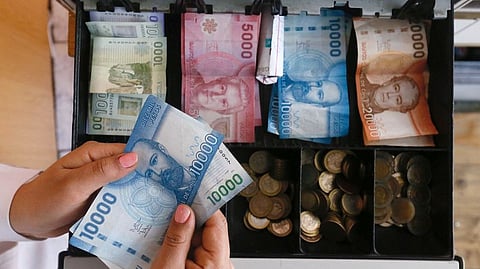

LONDON: Traditional debt crisis signs of crashing currencies, 1,000 basis point bond spreads and burned FX reserves point to a record number of developing nations now in trouble.
Sri Lanka, Lebanon, Russia, Suriname and Zambia are already in default, Belarus is on the brink and at least another dozen are in the danger zone as rising borrowing costs, inflation and debt all stoke fears of economic collapse.
Totting up the cost is eyewatering. Using 1,000 basis point bond spreads as a pain threshold, analysts calculate $400 billion of debt is in play. Argentina has by far the most at over $150 billion, while the next in line are Ecuador and Egypt with $40 billion-$45 billion.
Crisis veterans hope many can still dodge default, especially if global markets calm and the IMF rows in with support, but these are the countries at risk.
Argentina
The sovereign default world record holder looks likely to add to its tally. The peso now trades at a near 50% discount in the black market, reserves are critically low and bonds trade at just 20 cents in the dollar - less than half of what they were after the country's 2020 debt restructuring.
The government doesn't have any substantial debt to service until 2024, but it ramps up after that and concerns have crept in that powerful vice president Cristina Fernandez de Kirchner may push to renege on the International Monetary Fund. (Graphic: The Pain Has Spread)
Ukraine
Russia's invasion means Ukraine will almost certainly have to restructure its $20 billion plus of debt, heavyweight investors such as Morgan Stanley and Amundi warn.
The crunch comes in September when $1.2 billion of bond payments are due. Aid money and reserves mean Kyiv could potentially pay. But with state-run Naftogaz this week asking for a two-year debt freeze, investors suspect the government will follow suit. (Graphic: Ukraine Bonds Brace For Default)
Tunisia
Africa has a cluster of countries going to the IMF but Tunisia looks one of the most at risk.
A near 10% budget deficit, one of the highest public sector wage bills in the world and there are concerns that securing, or a least sticking to, an IMF programme may be tough due to President Kais Saied's push to strengthen his grip on power and the country's powerful, incalcitrant labour union.
Tunisian bond spreads - the premium investors demand to buy the debt rather than U.S. bonds - have risen to over 2,800 basis points and along with Ukraine and El Salvador, Tunisia is on Morgan Stanley's top three list of likely defaulters. "A deal with the International Monetary Fund becomes imperative," Tunisia's central bank chief Marouan Abassi has said. (Graphic: African Bonds Suffering)
Ghana
Furious borrowing has seen Ghana's debt-to-GDP ratio soar to almost 85%. Its currency, the cedi, has lost nearly a quarter of its value this year and it was already spending over half of tax revenues on debt interest payments. Inflation is also getting close to 30 per cent. (GRAPHIC: How Not To Spend It)
Egypt
Egypt has a near 95 per cent debt-to-GDP ratio and has seen one of the biggest exoduses of international cash this year - some $11 billion according to JPMorgan.
Fund firm FIM Partners estimates Egypt has $100 billion of hard currency debt to pay over the next five years, including a meaty $3.3 billion bond in 2024.
Cairo devalued the pound 15% and asked the IMF for help in March but bond spreads are now over 1,200 basis points and credit default swaps (CDS) - an investor tool to hedge risk - price in a 55% chance it fails on a payment.
Francesc Balcells, CIO of EM debt at FIM Partners, estimates though that roughly half the $100 billion Egypt needs to pay by 2027 is to the IMF or bilateral, mainly in the Gulf. "Under normal conditions, Egypt should be able to pay," Balcells said.
Visit news.dtnext.in to explore our interactive epaper!
Download the DT Next app for more exciting features!
Click here for iOS
Click here for Android